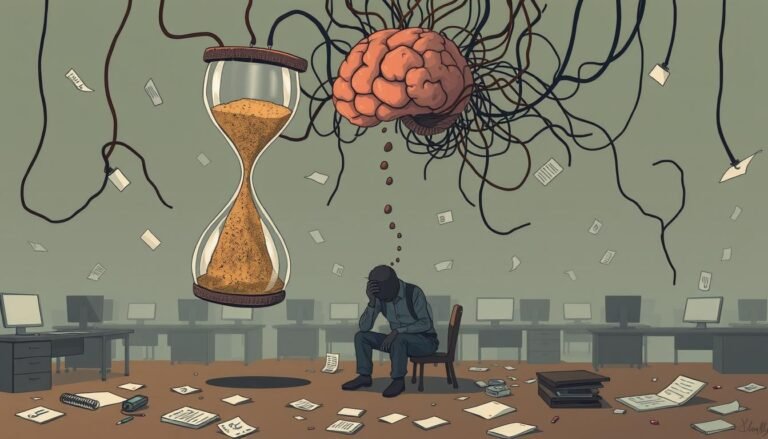Psychological Recovery Strategies
Mental health coping mechanisms are key to dealing with life’s ups and downs. They help us build emotional strength and improve our overall well-being. Techniques for healing from trauma and managing daily stress are crucial for everyone.
Studies show that 10-35% of people who go through trauma might develop PTSD. This shows how important it is to start recovery early and use effective strategies. The Skills for Psychological Recovery program, a brief 4-6 session program, has shown great results in reducing PTSD symptoms.
At work, strategies for psychological recovery are getting more attention. Research shows that using these techniques can boost work performance and employee health. This proves that mental health support is essential in the workplace.
Key Takeaways
- Psychological recovery strategies are crucial for mental well-being
- Early intervention can prevent PTSD development in trauma survivors
- Brief cognitive-behavioral interventions show effectiveness in stress reduction
- Workplace recovery strategies improve employee health and performance
- Relapse prevention requires ongoing support and skill development
- Stress management is key to maintaining psychological recovery
Understanding Mental Recovery Fundamentals
Mental recovery is key to feeling good overall. It helps bring back balance and a positive mood. This is vital for athletes and anyone dealing with stress or trauma.
Defining Psychological Recovery
Recovering mentally is a journey without a clear end. It’s about growing stronger and taking back control of your life. It’s more than just fixing symptoms; it’s about growing and becoming empowered.
The Science Behind Mental Restoration
Mental healing is based on how our brains work. It’s about our brain’s ability to heal and adjust after tough times. Using strategies for growth after trauma helps in this healing process.
Impact on Performance and Well-being
Good mental recovery boosts how well you perform and feel overall. Mindfulness has been shown to help with focus, lower anxiety, and increase emotional strength.
| Recovery Component | Impact |
|---|---|
| Peer Support | Creates sense of belonging |
| Self-Care | Promotes self-empowerment |
| Hope | Motivates overcoming obstacles |
| Holistic Approach | Addresses all life aspects |
Knowing these basics is important for creating good recovery plans. By using these strategies, people can build resilience and find lasting mental health.
Psychological Recovery Strategies in Athletic Performance
Top athletes now see the value in using psychological recovery strategies. These methods help them get back to their best both physically and mentally. This way, they can keep performing at their highest level.
Cognitive-Behavioral Therapy Approaches are key in building mental toughness. They help athletes deal with stress and think positively. Somatic Experiencing Methods also play a part, focusing on body awareness and tension release. This helps in full recovery.
Studies show that using the right recovery strategies can lead to better training results. It also makes athletes perform more consistently and lowers the chance of getting hurt. A study found that 96% of athletes knew about mental recovery techniques. But, only 13% used them after getting injured.
| Gender | Use of Mental Techniques Before Competitions |
|---|---|
| Males | 31% |
| Females | 13% |
Age and gender affect how athletes use mental techniques. Older athletes and males are more likely to use these strategies before competitions.
“Recovery is not just about physical rest; it’s about nurturing the mind to perform at its best.”
Adding relaxation techniques, pre-sleep routines, and rest days to training can boost mental recovery. Athletes should practice these regularly. This helps improve their performance and overall well-being.
Essential Components of Mental Health Recovery
Mental health recovery is a complex journey. It involves several key components. The Substance Abuse and Mental Health Services Administration identified 10 fundamental elements of recovery. These include self-direction, empowerment, and peer support.
Physiological Connections
Recovery isn’t just about the mind. It’s closely tied to our physical well-being. Cool-down exercises and proper hydration play crucial roles in this process.
These practices help regulate bodily functions. They promote overall wellness, supporting mental health recovery.
Neural Pathway Restoration
Rebuilding neural pathways is vital for long-term recovery. Techniques like Narrative Exposure Therapy can help rewire the brain. This promotes healthier thought patterns.
This approach allows individuals to process traumatic experiences. It helps build resilience.
Emotional Balance Management
Maintaining emotional equilibrium is key to sustained recovery. Emotional Freedom Techniques offer practical tools for managing stress and anxiety. These methods, combined with peer support and a strength-based focus, create a powerful framework for emotional stability.
“Recovery is a message of hope. People can and do overcome barriers and obstacles that confront them.” – National Consensus Statement on Mental Health and Recovery
Research shows that recovery is a non-linear process. It involves growth, setbacks, and learning from experiences. By integrating these essential components, individuals can build a solid foundation for lasting mental health and well-being.
Sleep and Rest as Recovery Tools
Sleep and rest are key for athletes to recover. They help in coping with mental health issues. Getting enough sleep and taking rest days can boost performance and well-being.
Optimal Sleep Patterns
Sleep is essential for recovery. Kids need 9-12 hours, teens 8-10, and adults 7-9. But, a study found:
- 64% of elite athletes reported poor sleep quality
- 65% of sub-elite athletes also experienced poor sleep
Creating Effective Pre-sleep Routines
Having a bedtime routine can improve sleep. It’s vital for athletes with anxiety. Good routines include:
- Dimming lights an hour before bed
- Avoiding electronic devices
- Practicing relaxation techniques
- Reading a book
Rest Day Implementation
Rest days are key for recovery. High-intensity athletes need a rest day every 7-10 days. They help avoid burnout and let athletes enjoy other activities.
| Athlete Level | Poor Sleep (%) | Sport-Specific Recovery Score | Fatigue Level |
|---|---|---|---|
| Elite | 64% | 3.22 | 2.52 |
| Sub-Elite | 65% | 2.91 | 2.52 |
Using these sleep and rest strategies can greatly improve recovery. It leads to better performance and mental health.
Mindfulness-Based Recovery Techniques
Mindfulness-based recovery techniques are powerful for those seeking to heal from trauma. They focus on being present and aware of thoughts and feelings without judgment. This reshapes the brain, improving both physical and mental health and overall well-being.
Research shows that mindfulness in addiction recovery programs is very beneficial. It helps people deal with stress, fight negative self-talk, and build compassion. Mindfulness teaches how to handle triggers without getting overwhelmed, helping to break the cycle of addiction relapse.
Core mindfulness practices for building emotional resilience include:
- Being present in the moment
- Focusing on breath
- Recognizing thoughts as thoughts
- Expanding compassion
- Practicing stillness
Mindfulness can be easily added to daily life. Simple exercises like focused breathing and mindful observation can be done anywhere, anytime. Starting the day with intentions, taking mindful breaks, and reflecting in the evening are very helpful for those in recovery.
“Mindfulness equips individuals to observe cravings and thoughts without acting on them, fostering resilience and supporting sustained recovery while preventing relapse.”
Studies show that mindfulness meditation reduces avoidance by teaching nonjudgmental acceptance. It interrupts harmful behaviors and improves emotional control, focus, and resistance to cravings. This reduces the chance of relapse.
Mindfulness practice builds inner stability and resilience, supporting lasting recovery. It helps people overcome recovery challenges with grace and bounce back from setbacks with more strength and wisdom. It’s a key tool in Trauma Healing Techniques and Emotional Resilience Building.
Relaxation and Breathing Methods
Relaxation techniques are key for athletes to reduce tension and boost energy. They are part of Post-Traumatic Growth Strategies and Mindfulness-Based Interventions. Let’s look at some effective methods.
Diaphragmatic Breathing Techniques
Deep breathing is a strong tool for relaxation. It involves taking full, cleansing breaths. It’s great for managing stress and can be done anywhere.
A 2020 study found deep breathing helps those with chronic conditions like COPD and heart problems. It’s also good for cancer patients.
Doing diaphragmatic breathing for 5 to 10 minutes, 3 to 4 times a day, can lower stress. It also improves health. Breathing at 5 full breaths per minute can reduce stress and help with depression.
Progressive Muscle Relaxation
Progressive muscle relaxation involves tensing and relaxing muscles step by step. It helps athletes notice tension and relaxation in their bodies. Regular practice improves body awareness and control.
Meditation Practices
Meditation brings calm and control, starting in the brain. It affects the body. Mindfulness meditation, focusing on the present, is popular in many areas.
Body scan meditation and visualization are good variations. You can use apps or audio guides for them.
| Relaxation Technique | Benefits | Practice Duration |
|---|---|---|
| Diaphragmatic Breathing | Stress reduction, improved health conditions | 5-10 minutes, 3-4 times daily |
| Progressive Muscle Relaxation | Enhanced body awareness, stress control | 15-20 minutes daily |
| Mindfulness Meditation | Improved focus, reduced anxiety | 10-30 minutes daily |
Adding these relaxation and breathing methods to daily routines can greatly help athletes recover. Regular practice is essential to get the most out of them.
Recovery Strategies for Peak Performance
To reach peak performance, athletes need a smart recovery plan. They can use Cognitive-Behavioral Therapy Approaches and Somatic Experiencing Methods. These methods help manage nerves before games and improve mental focus.
Training Integration Methods
It’s important to mix recovery into training plans. This means taking rest days, using relaxation techniques, and getting enough sleep. Studies say 7-9 hours of sleep each night is best for both body and mind.
Competition Preparation
Good prep is about both mind and body. Mindfulness and visualization can help stay focused and confident. Also, drinking the right amount of water before exercise is crucial.
Post-Event Recovery Protocols
Recovery after events covers both body and mind. Cold water immersion (CWI) can help with muscle soreness and improve performance. To rehydrate, drink 1.25-1.5 liters of water for every kilogram of weight lost during activity.
| Recovery Method | Benefits | Recommended Protocol |
|---|---|---|
| Cold Water Immersion | Reduces muscle soreness, improves performance | 10-15 minutes at 10-15°C |
| Contrast Water Therapy | Enhances acute performance | Alternate 1 min cold (10-15°C) and 2 min hot (38-40°C) for 6-12 minutes |
| Compression Garments | Reduces muscle soreness, improves recovery | Wear for 12-24 hours post-exercise |
Using these proven recovery methods can boost performance and lower injury risk. A mix of physical and mental prep is key to achieving peak performance.
Building Emotional Resilience Through Recovery
Emotional resilience is key to managing mental health and boosting well-being. Research shows resilient people handle anxiety and depression better. The Graduate University found that building resilience takes effort and reflection on personal experiences.
Narrative Exposure Therapy is a great way to build resilience. It helps people deal with traumatic events and create a clear life story. This way, they can manage stress and face future challenges more easily.
Emotional Freedom Techniques are also powerful for building resilience. These tapping methods help clear emotional blockages and lower stress. By combining physical and mental techniques, people can become more emotionally stable and adaptable.
Here are some practical ways to boost resilience:
- Regular exercise and a healthy diet
- Mindfulness to improve emotional awareness
- Strong social connections
- Cognitive-behavioral therapy techniques
- Expressive therapies and journaling
Recovery programs focus on teaching coping skills. These skills help manage stress, emotions, and triggers. Science shows resilience can grow over time through neuroplasticity, helping people adapt and grow from tough experiences.
| Resilience-Building Activity | Benefits |
|---|---|
| Narrative Exposure Therapy | Processes traumatic events, builds coherent life narrative |
| Emotional Freedom Techniques | Releases emotional blockages, reduces stress |
| Mindfulness Practices | Develops emotional awareness, manages emotion intensity |
| Regular Exercise | Improves mood, reduces stress |
Integration of Recovery in Daily Routine
Adding recovery strategies to your daily life is crucial for mental health and success. A study of 377 Norwegian employees found that making time for relaxation and freedom reduced work stress the next day. Let’s look at how to make recovery a regular part of your routine.
Scheduling Recovery Sessions
Make sure to set aside specific times for recovery. This could be 15 minutes each morning for meditation or using your lunch break for a calm walk. The important thing is to be consistent. Research shows that sticking to a routine helps avoid mental health setbacks.
Balancing Activity and Rest
It’s important to balance being active with taking time to rest. The Norwegian study mentioned earlier found that employees who relaxed during their free time had lower stress levels. Try to mix energizing activities with restful periods to keep your emotions stable.
Monitoring Recovery Progress
Keep an eye on how your recovery routine affects your well-being. Use a journal or app to track your mood, stress, and sleep. This information can help you fine-tune your recovery strategies for better results. The aim is to build a routine that supports your mental health over time.
Source Links
- Skills for Psychological Recovery
- Navigating Relapse: Strategies For Prevention And Recovery – Advantage Mental Health Center
- Optimizing work and off-job motivation through proactive recovery strategies – Nature Reviews Psychology
- Ten Components of Recovery | Department of Mental Health
- Recovery Model of Mental Illness: A Complementary Approach to Psychiatric Care
- Psychological Recovery: Giving back to keep your mind sharp – Mental Notes
- Use of mental techniques for competition and recovery in professional athletes
- 10 Fundamental Elements of Recovery | RIMS Center for Enrichment & Development
- Essential Elements That Contribute to the Recovery of Persons With Severe Mental Illness: A Systematic Scoping Study
- Rest and recovery are critical for an athlete’s physiological and psychological well-being
- The Sleep and Recovery Practices of Athletes
- 5 Mindfulness Practices for Addiction Recovery | Hazelden Betty Ford
- Mindfulness Techniques for Addiction Recovery – Lilac Recovery Center
- Mindfulness-Based Therapies for Substance Use Disorders: Part 1 (Editorial)
- Relaxation Techniques for Stress Relief – HelpGuide.org
- 10 Breathing Techniques for Stress Relief
- Recovery Techniques for Athletes
- RECOVERY STRATEGIES: The Key to Peak Performance leading into Finals | Melbourne Centre For Athletic Performance
- How To Build Emotional Resilience | Tips For Mental Strength
- Cultivating Resilience: Building Coping Skills In Addiction Recovery | A New Crossroad
- The Impact of Routine on Recovery
- Take Action, Recover Well? The Role of Daily Proactive Recovery Strategies for Recovery, Stress, Affect, and Next-Day Performance – Journal of Business and Psychology








